|
|
|
Sort Order |
|
|
|
Items / Page
|
|
|
|
|
|
|
| Srl | Item |
| 1 |
ID:
119061
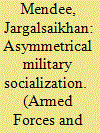

|
|
|
|
|
| Publication |
2013.
|
| Summary/Abstract |
This article presents a small state's perspectives on military socialization by examining military interactions at political and strategic, operational, and tactical as well as educational tiers. Transnational military socialization creates learning and socializing environments for militaries. However, the transnational military socialization process in Asia has received little scholarly attention, although its nature changed dramatically after the Cold War and 9/11. A small state often enters into asymmetric socialization with major powers. Mongolia presents an interesting case to capture these changes and impacts of transnational military interactions. The Mongolian military internalized Soviet military norms, ideas, and values during its seventy-year military socialization process. Since then, it has been attempting to disconnect from its communist past by internalizing the Western military norms, ideas, and culture even though it is isolated from the Western world. Interactions between Sino-Mongolian militaries over the past two decades have not resulted in any in-depth exchanges of ideas due to political, historical, and cultural factors. In the absence of explicit pressures from these three major powers, today the Mongolia military has consolidated a new identity, similar to a Western military. It has increased its contribution to peace support operations while attempting to disconnect its Soviet past and avoiding absorption from the growing Chinese military initiatives toward Central Asia. At the same time, Mongolia's military socialization with Russian or American militaries often triggers uncertainty for Chinese security.
|
|
|
|
|
|
|
|
|
|
|
|
|
|
|
|
| 2 |
ID:
179257
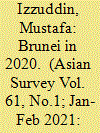

|
|
|
|
|
| Summary/Abstract |
In common with other countries around the world, Brunei Darussalam has had to deal with the coronavirus disease 2019 (Covid19) pandemic and its consequences. By the end of 2020, Brunei had navigated the pandemic storm successfully by keeping its social compact intact, achieving a relatively buoyant economy, exhibiting a balanced foreign policy through strategic hedging, and keeping the country secure through defense diplomacy. Ending 2020 in great shape places Brunei in good stead for assuming the chairmanship of ASEAN and future royal succession.
|
|
|
|
|
|
|
|
|
|
|
|
|
|
|
|
| 3 |
ID:
116369
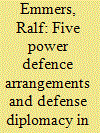

|
|
|
|
|
| Publication |
2012.
|
| Summary/Abstract |
The Five Power Defence Arrangements (FPDA) marked its 40th year of existence on November 1, 2011. What explains the durability of a collection of bilateral consultative arrangements initially conceived in the context of the British military withdrawal from East of Suez? Examining the FPDA as an institutional expression of defense diplomacy in Southeast Asia sheds light on its longevity. The arrangements have successfully operated as a defense diplomacy instrument by fulfilling three core functions. The FPDA has traditionally acted as a psychological deterrent with the fear of an assertive Indonesia in mind. It has performed a confidence-building role in the Singapore-Malaysian relationship. Finally, it has provided Australia, New Zealand, and the United Kingdom with an instrument to be engaged in Southeast Asian security.
|
|
|
|
|
|
|
|
|
|
|
|
|
|
|
|
| 4 |
ID:
110115
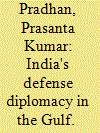

|
|
|
| 5 |
ID:
116366
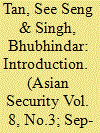

|
|
|
|
|
| Publication |
2012.
|
| Summary/Abstract |
Defense diplomacy is a relatively new phenomenon aimed at addressing the strategic complexity and uncertainty of the post-Cold War world. It has hitherto received little analytical attention where defense relations in Southeast Asia are concerned. Our article seeks to redress that lack. Borrowing from historical and contemporary debates on diplomacy, we offer a working definition of defense diplomacy that distinguishes its pragmatic and transformative aspects. Building on the four articles that follow, we suggest that bilateral and multilateral engagements in defense diplomacy by Asian countries have primarily been pragmatic in form and function, aimed at maintaining peaceful and stable regional relations. Our modest contribution is hopefully a useful start to what could in time become a meaningful debate and cumulative knowledge on defense diplomacy.
|
|
|
|
|
|
|
|
|
|
|
|
|
|
|
|
| 6 |
ID:
148353
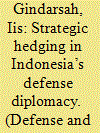

|
|
|
|
|
| Summary/Abstract |
With the rapid pace of regional arms modernization and unresolved territorial disputes, Indonesia is increasingly susceptible to the impact of emerging great power rivalry in Asia-Pacific. Rather than pursuing a robust military build-up, Indonesian policy-makers assert that diplomacy is the country’s first line of defense. This article argues that defense diplomacy serves two agenda of Indonesia’s hedging strategy – strategic engagement and military modernization. This way, Indonesian defense and security officials seek to moderate the impact of geopolitical changes while maintaining the country’s defensive ability against regional uncertainties.
|
|
|
|
|
|
|
|
|
|
|
|
|
|
|
|
| 7 |
ID:
162452
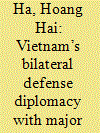

|
|
|
|
|
| Summary/Abstract |
The paper explores the development of Vietnam’s bilateral defense diplomacy with
world and regional powers including the United States, India, and Japan, with a
particular focus on the period from 2009 to 2018. The paper finds that Vietnam’s
multidirectional defense diplomacy is fundamentally shaped by its historical
experience, the contemporary shift in the balance of power and the strategic
challenges caused by China’s emerging power. By pursuing a multi–polar balance
among major partners, Vietnam avoids being pulled into their rivalry, and keeps its
non-alignment as well as strategic autonomy. The international defense cooperation
has become further deepened and more substantive to satisfy Vietnam’s strategic
interests including national security, territorial integrity, economic development
and regime legitimacy. However, domestic and geo–strategic constraints, and
asymmetrical economic interdependence with China lead this paper to suppose
further challenges in the future of Vietnam’s defense diplomacy.
|
|
|
|
|
|
|
|
|
|
|
|
|
|
|
|
|
|
|
|
|